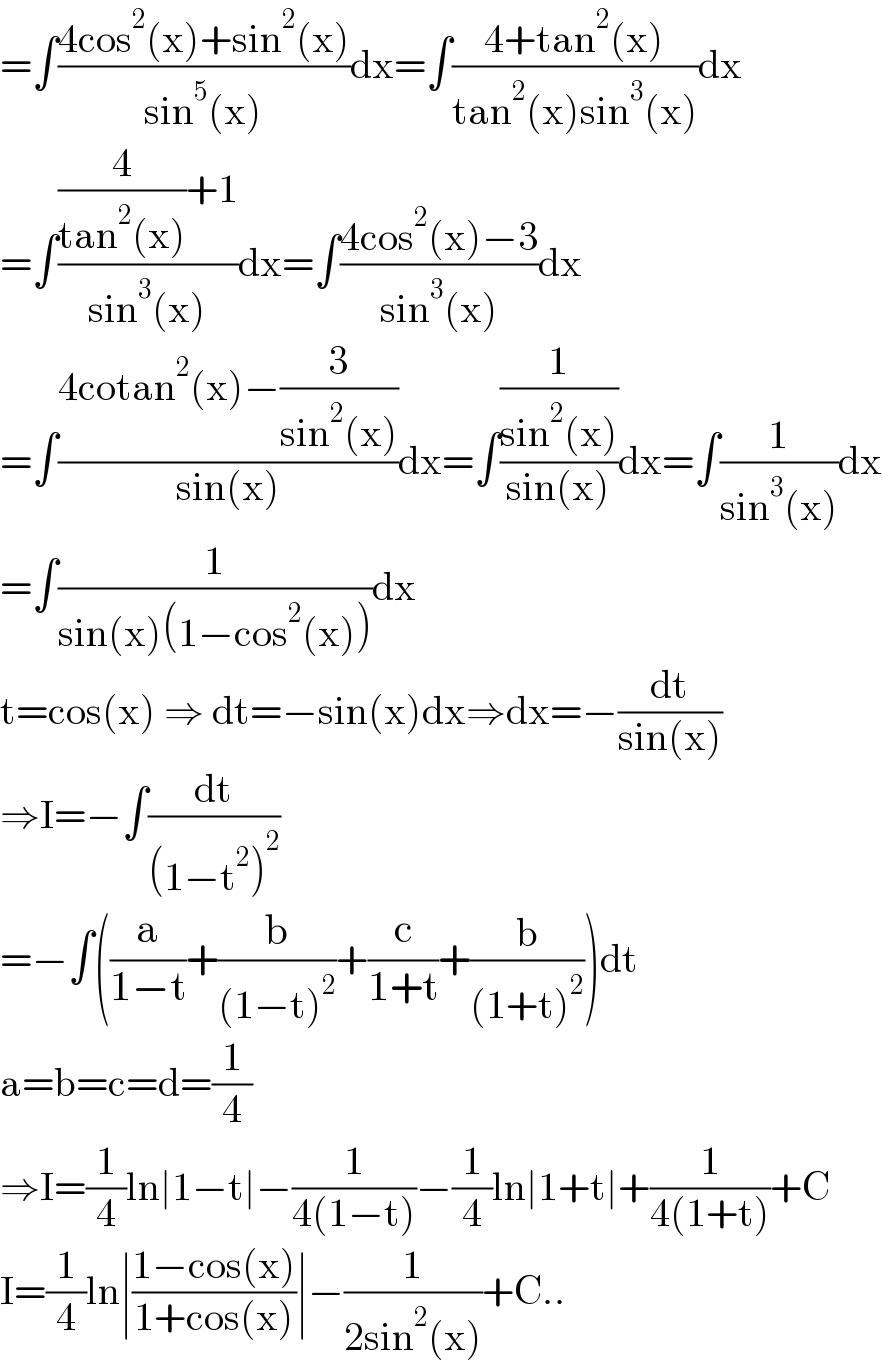Question Number 148137 by Willson last updated on 25/Jul/21

$$\int\:\:\frac{\mathrm{3}{cos}^{\mathrm{2}} \left({x}\right)+\mathrm{1}}{{sin}^{\mathrm{5}} \left({x}\right)}{dx}\:=\:??? \\ $$
Answered by puissant last updated on 25/Jul/21

$$=\int\frac{\mathrm{4cos}^{\mathrm{2}} \left(\mathrm{x}\right)+\mathrm{sin}^{\mathrm{2}} \left(\mathrm{x}\right)}{\mathrm{sin}^{\mathrm{5}} \left(\mathrm{x}\right)}\mathrm{dx}=\int\frac{\mathrm{4}+\mathrm{tan}^{\mathrm{2}} \left(\mathrm{x}\right)}{\mathrm{tan}^{\mathrm{2}} \left(\mathrm{x}\right)\mathrm{sin}^{\mathrm{3}} \left(\mathrm{x}\right)}\mathrm{dx} \\ $$$$=\int\frac{\frac{\mathrm{4}}{\mathrm{tan}^{\mathrm{2}} \left(\mathrm{x}\right)}+\mathrm{1}}{\mathrm{sin}^{\mathrm{3}} \left(\mathrm{x}\right)}\mathrm{dx}=\int\frac{\mathrm{4cos}^{\mathrm{2}} \left(\mathrm{x}\right)−\mathrm{3}}{\mathrm{sin}^{\mathrm{3}} \left(\mathrm{x}\right)}\mathrm{dx} \\ $$$$=\int\frac{\mathrm{4cotan}^{\mathrm{2}} \left(\mathrm{x}\right)−\frac{\mathrm{3}}{\mathrm{sin}^{\mathrm{2}} \left(\mathrm{x}\right)}}{\mathrm{sin}\left(\mathrm{x}\right)}\mathrm{dx}=\int\frac{\frac{\mathrm{1}}{\mathrm{sin}^{\mathrm{2}} \left(\mathrm{x}\right)}}{\mathrm{sin}\left(\mathrm{x}\right)}\mathrm{dx}=\int\frac{\mathrm{1}}{\mathrm{sin}^{\mathrm{3}} \left(\mathrm{x}\right)}\mathrm{dx} \\ $$$$=\int\frac{\mathrm{1}}{\mathrm{sin}\left(\mathrm{x}\right)\left(\mathrm{1}−\mathrm{cos}^{\mathrm{2}} \left(\mathrm{x}\right)\right)}\mathrm{dx} \\ $$$$\mathrm{t}=\mathrm{cos}\left(\mathrm{x}\right)\:\Rightarrow\:\mathrm{dt}=−\mathrm{sin}\left(\mathrm{x}\right)\mathrm{dx}\Rightarrow\mathrm{dx}=−\frac{\mathrm{dt}}{\mathrm{sin}\left(\mathrm{x}\right)} \\ $$$$\Rightarrow\mathrm{I}=−\int\frac{\mathrm{dt}}{\left(\mathrm{1}−\mathrm{t}^{\mathrm{2}} \right)^{\mathrm{2}} } \\ $$$$=−\int\left(\frac{\mathrm{a}}{\mathrm{1}−\mathrm{t}}+\frac{\mathrm{b}}{\left(\mathrm{1}−\mathrm{t}\right)^{\mathrm{2}} }+\frac{\mathrm{c}}{\mathrm{1}+\mathrm{t}}+\frac{\mathrm{b}}{\left(\mathrm{1}+\mathrm{t}\right)^{\mathrm{2}} }\right)\mathrm{dt} \\ $$$$\mathrm{a}=\mathrm{b}=\mathrm{c}=\mathrm{d}=\frac{\mathrm{1}}{\mathrm{4}} \\ $$$$\Rightarrow\mathrm{I}=\frac{\mathrm{1}}{\mathrm{4}}\mathrm{ln}\mid\mathrm{1}−\mathrm{t}\mid−\frac{\mathrm{1}}{\mathrm{4}\left(\mathrm{1}−\mathrm{t}\right)}−\frac{\mathrm{1}}{\mathrm{4}}\mathrm{ln}\mid\mathrm{1}+\mathrm{t}\mid+\frac{\mathrm{1}}{\mathrm{4}\left(\mathrm{1}+\mathrm{t}\right)}+\mathrm{C} \\ $$$$\mathrm{I}=\frac{\mathrm{1}}{\mathrm{4}}\mathrm{ln}\mid\frac{\mathrm{1}−\mathrm{cos}\left(\mathrm{x}\right)}{\mathrm{1}+\mathrm{cos}\left(\mathrm{x}\right)}\mid−\frac{\mathrm{1}}{\mathrm{2sin}^{\mathrm{2}} \left(\mathrm{x}\right)}+\mathrm{C}.. \\ $$
